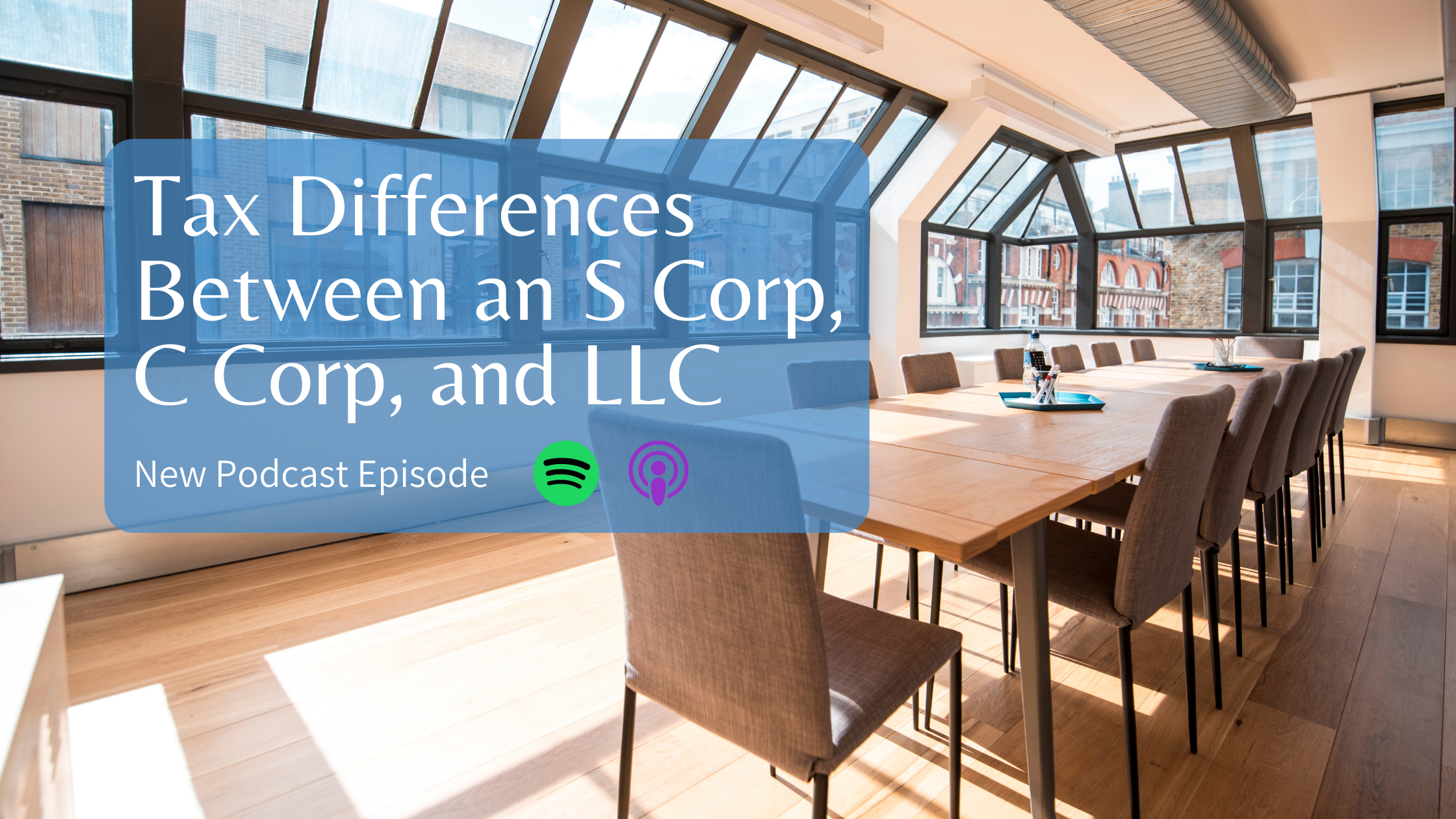
Tax Differences Between an S Corp, C Corp, and LLC
On today’s new episode of the Wiser Roundtable Podcast, Jordan Sute, CPA, joins Casey to talk about the tax differences between an S Corp, C Corp, and LLC. In 2009, there were 560,000 new businesses formed. In 2020, there were 804,000 new businesses formed. Every year, there are more companies being formed in America. In light of these increasing numbers, we wanted to go down the list of business classifications.
Listen on Apple Podcasts or watch on YouTube:
SUMMARY:
Sole Proprietor
If you do nothing, you are a sole proprietor. It all goes on your personal tax return. The downside is that you have to pay income tax on all earnings and self-employment tax. You do get the employer side deduction on the other side of that, but it doesn’t necessarily offset your self-employment tax, especially if you have a lot of earnings. Self-employment tax is your Medicare and FICA tax that you would be paying if you were a 1099 employee. This also means that you are personally liable for any lawsuits against the business.
Limited Liability Company (LLC)
For tax purposes, there is not a big difference between an LLC and being a sole proprietor when it comes to filing taxes. It does allow you to explore your options of filing an S Corp or a partnership. The LLC will shelter your liability. This means that all lawsuits would stop at the LLC and not be able to reach your personal assets.
LLC and S Corp
To become an S Corp, you would have to incorporate or become an LLC that is an S Corporation. The rules for applying are a little strict and should be looked at with a CPA. The biggest advantage is the savings on self-employment tax. If you are an S Corp, there is a way to escape payroll tax as long as you show a reasonable wage. The idea is that you would take a salary and then take a draw that is subject to income tax.
Multimember LLC
If you’re a single member of an LLC, it just flows through your personal tax return. If you’re a multimember LLC (a partnership), there is an additional tax filing. Anyone can own an LLC except for banks.
Starting an S Corp
You don’t have to be an LLC and then file for an S Corp, you can just file for an S Corp. You would incorporate and then choose to be an S Corp. Then you would become a shareholder rather than a member. Corporations cannot own S Corps, but LLC’s can own S Corps. The disadvantages are the formalities of the process – you have to maintain good books and records.
C Corp
There would have to be something other than tax leading you to create a C Corp because it really is not advantageous at the small business level. The C Corp is its own entity and it pays tax at the corporate tax level. If it has a loss, the loss stays at the C Corp. You don’t get to offset any of your personal income tax filing.
TIMESTAMPS:
1:52 Sole Proprietor
4:17 Limited Liability Company (LLC)
5:30 LLC and S Corp
13:36 Multimember LLC
16:49 Starting an S Corp
21:16 C Corp
LINKS:
Learn more about Casey Smith and connect with him on Twitter.
Learn more about Brad Lyons.
Learn more about Matthews Barnett.
CONNECT:
Twitter, Instagram, Facebook, LinkedIn, and YouTube.
Learn more about the Wiser Wealth Management Roundtable podcast and access previous episodes.
Share This Story, Choose Your Platform!
Wiser Wealth Management, Inc (“Wiser Wealth”) is a registered investment adviser with the U.S. Securities and Exchange Commission (SEC). As a registered investment adviser, Wiser Wealth and its employees are subject to various rules, filings, and requirements. You can visit the SEC’s website here to obtain further information on our firm or investment adviser’s registration.
Wiser Wealth’s website provides general information regarding our business along with access to additional investment related information, various financial calculators, and external / third party links. Material presented on this website is believed to be from reliable sources and is meant for informational purposes only. Wiser Wealth does not endorse or accept responsibility for the content of any third-party website and is not affiliated with any third-party website or social media page. Wiser Wealth does not expressly or implicitly adopt or endorse any of the expressions, opinions or content posted by third party websites or on social media pages. While Wiser Wealth uses reasonable efforts to obtain information from sources it believes to be reliable, we make no representation that the information or opinions contained in our publications are accurate, reliable, or complete.
To the extent that you utilize any financial calculators or links in our website, you acknowledge and understand that the information provided to you should not be construed as personal investment advice from Wiser Wealth or any of its investment professionals. Advice provided by Wiser Wealth is given only within the context of our contractual agreement with the client. Wiser Wealth does not offer legal, accounting or tax advice. Consult your own attorney, accountant, and other professionals for these services.





